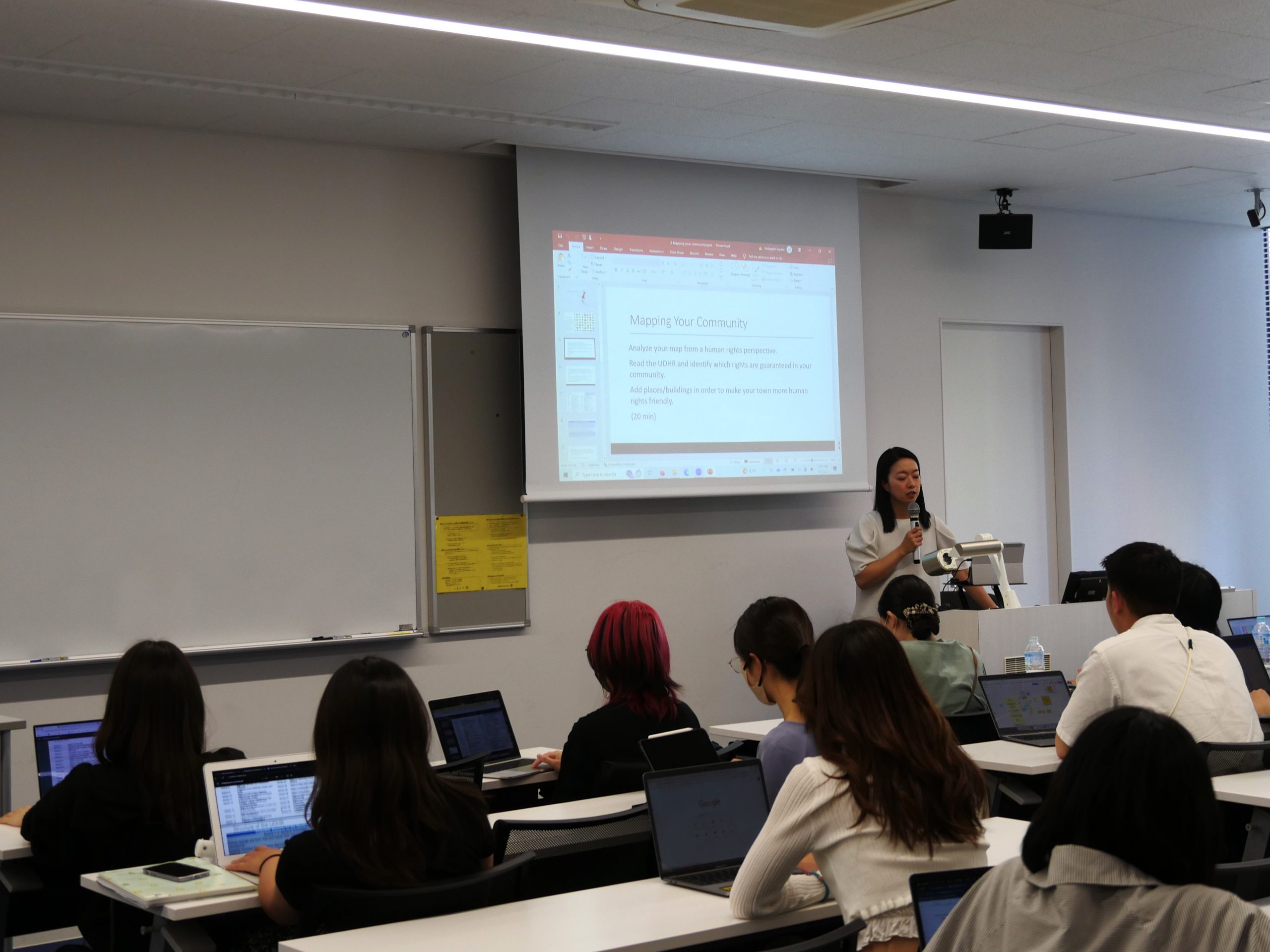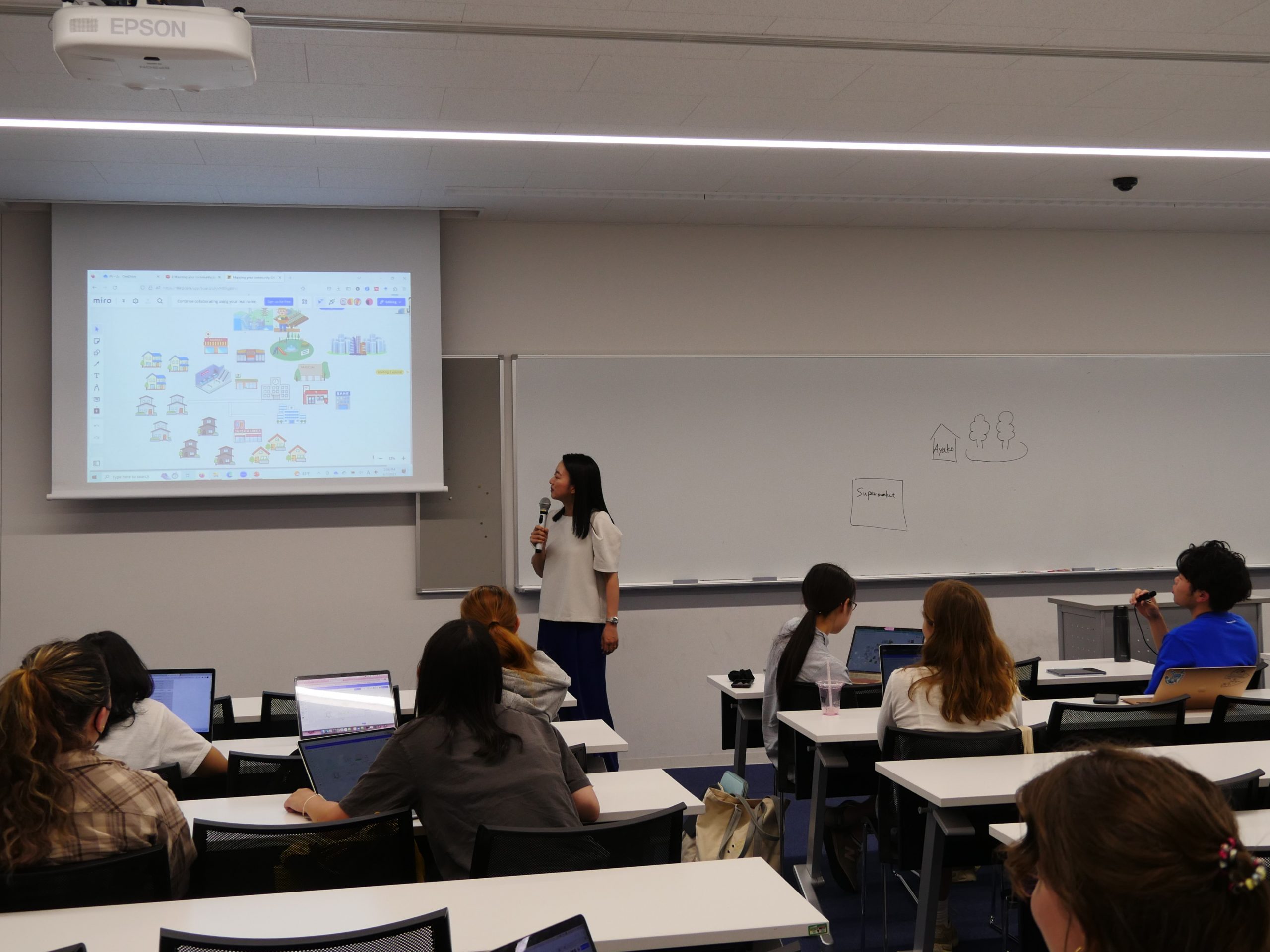授業紹介:INTERNATIONAL ORGANIZATION:THEORY AND PRACTICE
教員からのコメント Comment of Professor
This course consists of fourteen sessions designed to teach students about the main missions, or three pillars, of the United Nations: peace and security, human rights, and development. Students study each field, spanning four sessions, respectively, accompanied by an introduction and conclusion. Through this course, students receive lectures on fundamental academic theories and policy practices in each field, cultivating critical analytical skills to understand ongoing world affairs. Unlike other International Organization courses that may adopt legal or historical approaches, this course takes a political approach, explaining International Organization as a process. It encourages students to question how state-to-state relations are or become organized. Each field of peace and security, human rights, and development includes at least one session for student-centered activities. For instance, after studying the history and basics of the Universal Declaration of Human Rights (UDHR), students engage in group work called "mapping your community." They freely draw their ideal maps and then, reflecting on the UDHR, engage in discussions about the human rights protected in their community, suggestions for improving the map to enhance human rights protection, and different perspectives of various groups such as children or refugees. The students, who come from diverse backgrounds and possess varied experiences and knowledge, critically analyze the map and explore questions such as, "Are there other ways to protect human rights that cannot be expressed on a map?" Eleanor Roosevelt, the drafter of the UDHR, stated that universal human rights begin with the actions of citizens in small places that cannot be seen on a map. Although International Organization may seem distant, involving diplomatic negotiations and military interventions, this course aims to ensuring that students internalize the knowledge they acquire.
この講義は、国連の主要任務の3本柱である「平和と安全」、「人権」、「開発」を講義4回分ずつ学び、導入と総括を合わせた全14回で構成されています。学生が各分野の基礎的な学術的議論や政策実践を理解するとともに、現在進行形の世界情勢を批判的に検討できる力を養うことを目指しています。国際機構論というと、国際組織の構成や関連する条約を学ぶ国際法的アプローチ、国際組織の設立や変遷を学ぶ歴史的アプローチがあります。対照的に、本講義はInternational Organizationとはプロセスであると説明し、国家と国家の関係がどう組織されていくのかという政治的アプローチをとるところに特徴があります。
平和と安全、人権、開発それぞれで、講義1回分は、学生主体のアクティブ・ラーニング型授業を取り入れています。例えば、人権分野では、世界人権宣言の基礎を学んだあとに、「自分の街の地図を描こう」というワークをおこないます。グループで、自分たちの理想の地図を自由に描き、その後、世界人権宣言を振り返りながらどのような人権が守られる街か、より人権が守られる街にするにはどうしたら良いのか、あるいは、自分ではない立場の人の視点で地図を見るとどうか、など学生間で議論します。多様なバックグラウンドを持つ学生が、異なる経験や知識を持ち寄って、「地図では表現できない人権の守り方もあるのではないか」などを含め、批判的検討をおこないます。世界人権宣言の起草者であるエレノア・ルーズベルトは、普遍的人権は地図で見えないほど小さい場所での市民の行動によって始まるといいました。国際機構論というと、外交交渉や軍事介入を含めたどこか遠くで起こっている話と捉えられがちですが、この講義では学生が頭で学んだことが「腹に落ちる」という時間を大切にしています。

学生からの声 class interview
Q1 Outline of the class.
The course aims to familiarise students with the concepts of international organisation such as the United Nations. It also aims to mobilise knowledge and the use of terminology and jargon often used in the declarations and policies of these organisations.
Q2 Why did you decide to take this class?
There are very limited options for SPSF FGS courses available in the first year, so this was the only option from this faculty. Nevertheless, this course does also closely relate to my interests and also my future employment perspectives.
Q3 What did you find attractive about this class?
There was a simple course outline with a clear topic covered in each lecture.
Q4 How do you want to connect what you learned in the class to the next?
Now that I understand and can utilise various terms and concepts, I would like to use them in examples and circumstances that will help me apply theories to reality.
(2nd year, Faculty of Global Studies)
質問① 授業概要
この科目では学生が国連などの国際機関の概念を理解することを目的としています。また、これら国際機関から発信される宣言や方針で使用される用語や専門用語について知り、それらを使用することも目指しています。
質問② この授業を履修しようと思った理由
1年次に履修できるSPSF-総合グローバル学部開講の科目が非常に限られているため、この科目を履修することとしました。その状況でしたが、この科目は自身の興味・関心と将来の就職に関わる志望と密接に関係していると言えます。
質問③ この授業の魅力
科目概要はわかりやすく、各講義では明確なトピックが取り上げられます。
質問④ この授業で学んだことを次にどう繋げたいですか
様々な用語や概念を理解し、運用できるようになったことから、今後は理論を現実に適用していく事例や状況において、それらを使っていきたい考えです。
(総合グローバル学部2年生)
Q1 Outline of the class.
Today’s class was one of the three group activities that we will have within the course. For this activity, we were arranged into 12 groups by the professor before class and were asked to create an ideal community by going over two processes. Initially, we were told to map a community with a free mindset, but in the next stage, the professor asked us to continue mapping our ideal community by also considering the possible UDHR (Universal Declaration of Human Rights) that the group thinks need to be protected within the ideal community. One of the interesting things that I encountered within this activity is that it helped me realize how blinded I was regarding the ability to make a perfect community that contains all the necessary UDHR. We found many falsehoods in our community that needed to be reinforced when we were told to look over our ideal community from the perspective of children’s rights.
Q2 Why did you decide to take this class?
I took this class because I enjoyed taking Professor Kobayashi’s “International Politics” class from last semester. I’m an FLA student, and though there were classes with similar content to this class, I noticed other students saying that most of the introductory-level courses in such fields are all lectured based. But when I tried out her class, the professor was keen on having a group activity at least three times during the semester which made me feel like I not only simply learned new things from that class, but I also learned how to use what I’ve learned in real life contexts.
Q. 3 What did you find attractive about this class?
As previously mentioned, the course that Professor Kobayashi offers seems to heavily value group activities. Because of this, as a student, not only am I be able to recap what we learned so far and see if I truly understand the materials in the class or not, but I can also apply the concepts that we learn in real life contexts. On top of this, I liked hearing what the other students in the class would have to say about the things we learned so far, and the comments we can receive from the professor are reassuring in terms of making sure that I’m on the right track in class.
Q. 4 How do you want to connect what you learned in the class to the next?
At some point in my life I want to work in aspects of the field of humanitarian affairs. Since the professor has worked in such a field as a profession, I try to use this as leverage to ask questions that are related to such topics for me to be able to see the professor’s perspective of the current issues. Sophia University offers a great number of social gatherings or sessions that deal with certain issues and fields which offers a vast opportunity for the students. In my case, generally speaking, most of them are unavailable to attend because my classes are often in the same time periods.
(Manaka Kameyama, 2nd year, Faculty of Liberal Arts)
質問① 授業概要
今日の授業では、当初より予定されていた3つのグループワークの内の1つが行われました。授業前に受講者は12グループに分けられ、以下の2つのプロセスで、理想のコミュニティを形作るようにと指示がありました。初めに理想のコミュニティを自由に計画し、その後、さらに世界人権宣言(UDHR)を踏まえて、理想のコミュニティを考えるというものです。このワークに参加して興味深かったのことの1つは、UDHRのすべてを盛り込んだ理想のコミュニティを作るうえで、いかに自分が盲目的であったかを思い知らされたことです。我々が作成した理想のコミュニティを子供の権利の観点から見直すように言われた際、改めるべき点が多く存在することに気が付きました。
質問 ② この授業を履修しようと思った理由
先学期、小林先生のInternational Politics の科目を履修して興味深かったので、この科目を受講しました。私はFLAに所属しており、FLAでもこの科目と似た内容の科目が開講されています。同級生よりこの分野の入門レベル科目は講義形式が多いと聞いていました。しかし、小林先生はこの科目で学期中に少なくとも3つのグループワークを熱心に取り入れてくださっているため、単に新しいことを学ぶだけではなく、学んだことをどのように実際の生活で活用したらよいかを学びました。
質問③ この授業の魅力
先にも述べたとおり、小林先生のこの科目ではグループワークを重視されている点が挙げられます。そのことから学生として学んだことを振り返り、内容を本当に理解しているかどうかを確認できるだけでなく、学んだことを実生活で応用することもできます。なによりも同級生からこれまでに学んだことを聞くことができることもいいなと思いますし、先生がフィードバックくださるので、自身が正しい方向に進んでいるかを確認でき励みになります。
質問④ この授業で学んだことを次にどう繋げたいですか
いつか人道関係の分野で働きたいと考えています。小林先生はその分野で働いておられたので、時事問題に対するの先生の視点を自分自身が理解できるよう、質問をしています。上智大学には特定の課題やこの分野に関連する集まりやセッションが数多くあり、学生にとってとても大きな可能性が提供されています。私の場合、授業と同時間帯に開催されることが多くほとんど参加できていません。
(亀山愛華 国際教養学部 2年生)

Q1)
This class introduces various foundational principles and theories upon which international organizations are founded and operate on. The class is structured with an emphasis on the United Nations and explores the course concepts through the three pillars of the UN: peace and security, human rights, and development. Through this class students are encouraged to engage with the larger role of the UN, other international organizations, and related actors and institutions to build a better understanding of global interdependence and the building of a more sustainable future.
Q2)
I am interested in international organizations, especially the UN, because they are such large players in various sectors within the international community. However, I am not very knowledgeable about this topic and it is a very broad area of study. So I am taking this class as an opportunity to gain foundational knowledge about the UN, international organizations, and global relations which will surely be helpful in my future studies. I am also interested in possibly pursuing international relations as my major, so this class is also something that closely aligns with a possible academic path.
Q3)
There are a lot of things to know in relation to international organizations. What is their purpose? What are they actively involved in? How are they structured and how do they operate? The questions are endless and it can be difficult to find and connect all of this information into a comprehensive understanding. But with this class, the base information is provided in a well-organized manner and from there, I can develop my thinking and connect the information to other areas of my study. Furthermore, Professor Kobayashi has a lot of insights and experience with international organizations, international relations, and politics. Her knowledge and experiences further enrich the class and put into perspective the importance and role of international organizations in the past, present, and future.
(Kang Natalie Mio, 2nd year, Faculty of Global Studies)
質問①
この科目では国際機関の設立、運営に関わる様々な基本となる原則や理論について紹介されます。この科目は国連に重点を置いて構成されおり、平和と安全、人権、開発という国連の3本柱を踏まえて、科目の到達目標に向かって探求する内容となっています。この科目を通して、学生は国連や他の国際機関、関連団体・機関の大きい役割について関わり、グローバルな相互依存と、より持続可能な未来の構築についての理解を深めます。
質問②
私が国際機関、特に国連に興味がある理由は、それらが国際社会の様々な分野で大きな役割を果たしているからです。しかし、私はこのトピックについてあまり知識がなく、またこの分野は非常に幅広い研究分野です。そのため、私は国連や国際機関や世界規模での関係について基本的な知識を得る機会としてこの科目を受講しています。今後の勉強に必ず役に立つと考えています。私は国際関係論を専攻することに興味があるため、この履修はこれからの学習計画に沿ったものです。
質問③
国際機関に関して知るべきことがたくさんあります。目的は何であるか。何に積極的に関わっているのか。どのように構成され、機能しているのか。疑問は無限にあり、全ての情報を収集し、結びつけて包括的に理解することは難しいです。しかし、この科目では基本的な情報がまとめられた形で提供されることから、そこから自分の考えを発展させ、また得た情報を他分野の学習に結びつけることができます。さらに、小林先生は国際機関、国際関係、政治に関して多くの見識と経験をお持ちです。小林先生の知識と経験によって科目での学びがさらに豊かになっており、過去、現在、未来における国際機関の重要性と役割を視野に入れた内容となっています。
(カング ナタリー ミオ 総合グローバル学部 2年生)
